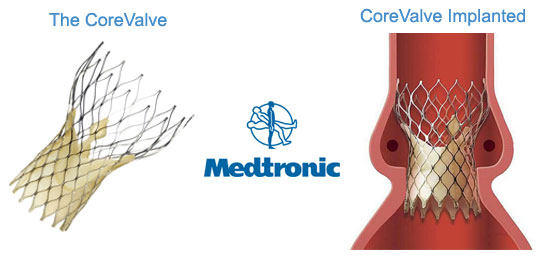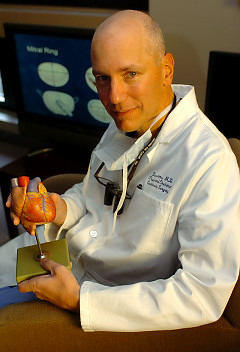Tech Update: Medtronic Reaches Major Milestones For CoreValve Transcatheter Aortic Valve Replacement Device
By Adam Pick on September 5, 2012
As a technology enthusiast, I really enjoy monitoring the new devices impacting heart valve therapy.
That said, I thought you might want to learn about the CoreValve, a new transcatheter aortic valve replacement device for patients with aortic stenosis (a narrow heart valve). As you can see in this video post, the CoreValve replaces a diseased aortic valve without any incision to the patient’s sternum or ribs.

Last week, Medtronic, the manufacturer of the CoreValve, announced the following:
- Enrollment of the CoreValve United States Pivotal Trial is complete. In total, 1,500 patients who are at “high” or “extreme” risk for surgery will participate in the trial.
- Medtronic received FDA conditional approval to start evaluating CoreValve performance in the “intermediate” risk patient population. Enrollment for this study, known as the SURTAVI trial, will begin shortly.
Reflecting on this announcement, Doctor Adams, MD, Chairman of the Department of Cardiothoracic Surgery at Mount Sinai Medical Center, stated:
“With a sizeable population of Americans with severe aortic stenosis who have varying degrees of risk for open-heart aortic valve replacement surgery, the CoreValve U.S. Pivotal Trial and SURTAVI Trial are landmark trials that will provide critical insights about the appropriate use of the self-expanding CoreValve System.”
The results of these studies should be very interesting considering that the majority of CoreValve patients have been too frail (or inoperable) for traditional open heart surgery. Since 2007, the CoreValve device has been implanted in more than 30,000 patients in 60 countries.
While there is much excitement about the use of transcatheter valve therapies, like the CoreValve, it appears that that there is much to learn about the performance of these new devices in each patient segment — from inoperable patients to lower risk patients. As we have seen, there have been some concerns regarding these newer technologies, including the risk of patient stroke.
Going forward, I’ll be sure to track these studies and technologies as trial results become available.
Keep on tickin!
Adam
|
Donald Henry says on September 6th, 2012 at 2:54 pm |
|
Can this new technology ( transcatheter valve, be used on a re-do patient, who is in their 70’s? |
 |
|
George Neuner says on September 6th, 2012 at 2:55 pm |
|
I’m only a rocket scientist, not a doctor, but it seems to me that all those sharp points could puncture or otherwise damage the heart and artery. Also, placing the core valve inside the existing valve decreases the valve opening diameter, which is further stenosis. What’s needed is a better understanding of what causes stenosis in the first place and treat that. |
 |
|
Donald Henry says on September 6th, 2012 at 3:53 pm |
|
I’m not a rocket scientist or a doctor, but one does not have to have stenosis to need an aorta valve replacement. You can be born with a bi-cuspid valve and will eventually need a valve replacement. I had my second operation in Dec. 2011, so I would be glad to learn more about the transcatheter core valve, because I certainly don’t want to have to try and survive a third operation. |
 |
|
zafar says on September 7th, 2012 at 10:15 am |
|
Hi Adam. Thank you very much for valuable update. |
 |
|
john says on September 25th, 2012 at 11:29 am |
|
My son Samuel had aortic valve replacement 4 years ago. no problems so far, it was a pig valve. what is the life span for this valve. And is there any other way to replace his valve besides cracking open his chest? |
 |












